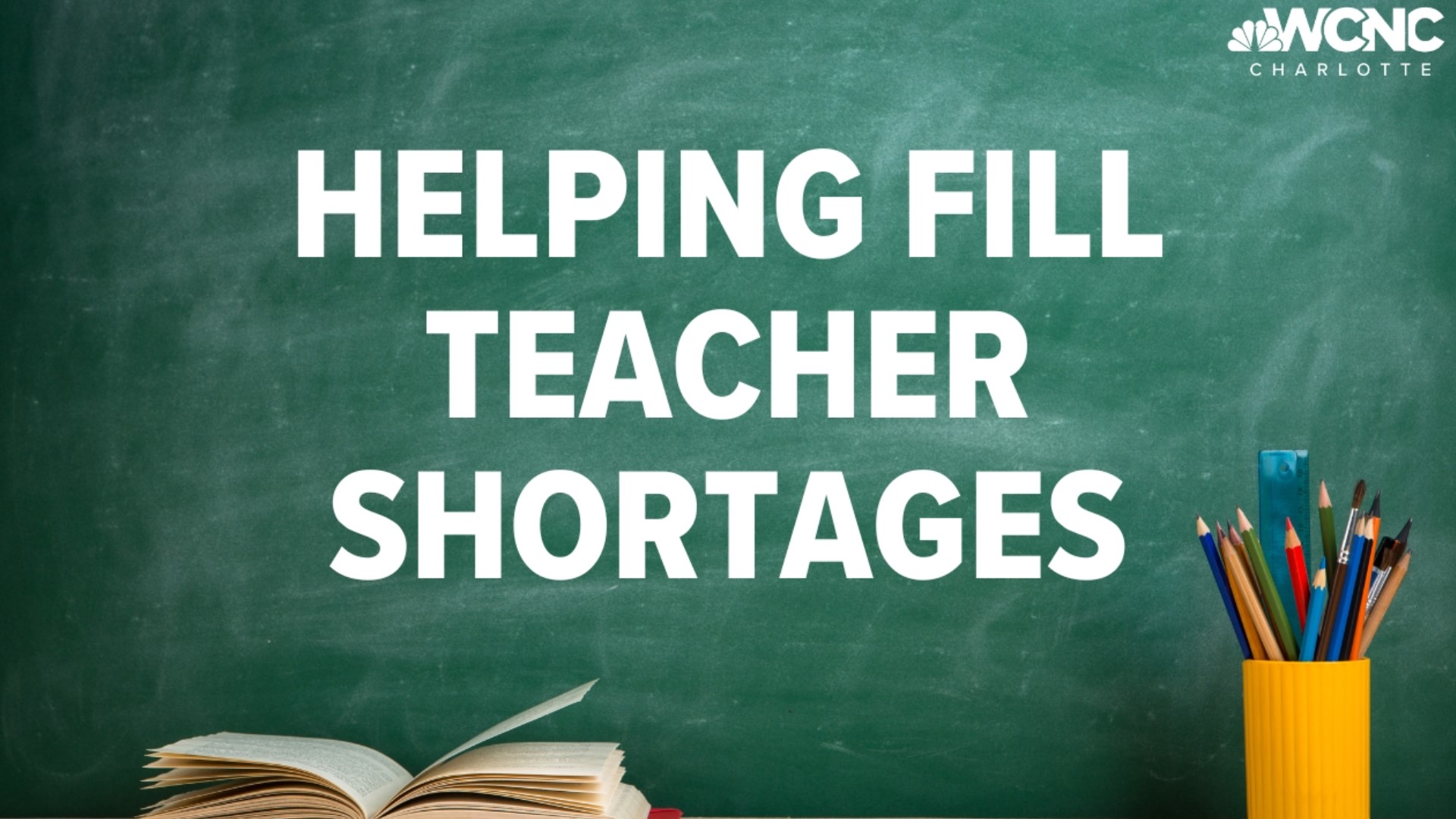CHARLOTTE, N.C. — More than halfway through the school year, there are still plenty of school vacancies in North Carolina schools.
A state report anticipates the ongoing teacher pipeline shortage around the state will only worsen in the next few years. This is partly due to the number of people enrolling in programs to become a teacher being in a deep decline.
The number of students enrolling in a college for a teaching degree in North Carolina is down by 42% in just a year. The state hasn’t seen those numbers since 2017.
The state relies heavily on programs like Teach for America to help recruit the future workforce.
"Overall, the organization nationally, in the past couple years, has been impacted by COVID," Monique Perry-Graves, Teach for America North Carolina's executive director, said. "And its recruitment is similar to what you see on college campuses."
Teach for America is a nationwide program that places college graduates in schools across the United States. The recruits are placed in low-income school districts for a minimum of two years.
"There's a very rigorous process to get into the program," Perry-Graves said. "Because we want the top quality talent serving our kids across the nation. And we want to know that that commitment is real."
The program also helps fill vacancies in hard-to-recruit areas like STEM, exceptional children, and special education fields.
Latoya Faustin, the executive director of She Built this City, said her time in Teach for America shaped her trajectory in life.
"I went into the Teach For America experience thinking I was going to be an attorney," Faustin said.
She was getting ready for the LSAT.
"My time in the classroom and the networks with which I was connected, Teach for America, forever changed what I thought could be possible," Faustin said.
Faustin was a teacher in Texas serving students in the Rio Grande Valle as a high school English teacher.
"My time serving on the border was, it was transformational," Faustin said.
The push to get more people like Faustin into TFA has declined in the past few years.
"We're starting to see a little bit of light of hope in some of our recruitment numbers that we expect to rebound," Perry-Graves said. "Particularly here in the Charlotte area."
Perry-Graves said the majority of TFA recruits coming to North Carolina are placed in Charlotte-Mecklenburg Schools.
In February, CMS still needed almost 400 teaching positions filled. TFA has helped chip away at some of them.
"We have a national recruitment team that is scouting for talent across college campuses across the nation," Perry-Graves said.
TFA is also working to ensure its teachers stay in classrooms longer.
"What is the barrier, in some cases to that when housing may not be as affordable? You know, what are some of those costs related to teacher pay?" Perry-Graves said.
There are political and economic challenges outside TFA's control impacting retention rates.
Other teacher programs are also seeing their recruits leave North Carolina schools.
A state report shows TFA teachers left North Carolina schools last year at a rate higher than beginning and experienced licensed teachers.
"We have close to 700 educators still serving in classrooms well beyond their teacher commitment, and overall, about 2,200 alumni, whether they're still in the classroom, or serving in nonprofit organizations supporting education," Perry-Graves said.
TFA continues to work with its alumni network to improve schools.
She Built this City works with CMS schools to educate students about the alternative paths of trade work after high school.
"Our goal is to know that there's a choice," Faustin said. "And then give them every tool figuratively and literally that they need to choose the path that worked best for them and their family."
Faustin said her experience in TFA directly led her to her current journey, but it was hard leaving the classroom.
"I realized that no matter how good of a teacher, I was, no matter how well they exceeded, in my class, if there was not access to affordable housing, if there was not a pathway to jobs, if there was not access to healthy, affordable foods, they were going to stay in that cycle of poverty, regardless of the grade they got in my class," Faustin said.
Faustin said her time in the classroom was critical and that having someone in the classroom who chooses to stay for two or twenty years makes a difference.
Perry Graves said the path forward is looking up.
"I think we have a lot of people in our community who are very much concerned and focused on the issue of education, and we need everybody, we need everybody's voice. We need everybody's input," Perry-Graves said. "And we always need to make sure that we keep kids at the center."
Shamarria Morrison: Contact Shamarria Morrison at smorrison@wcnc.com and follow her on Facebook, Twitter and Instagram.
WCNC Charlotte is committed to reporting on the issues facing the communities we serve. We tell the stories of people working to solve persistent social problems. We examine how problems can be solved or addressed to improve the quality of life and make a positive difference. WCNC Charlotte is seeking solutions for you. Send your tips or questions to newstips@wcnc.com.

